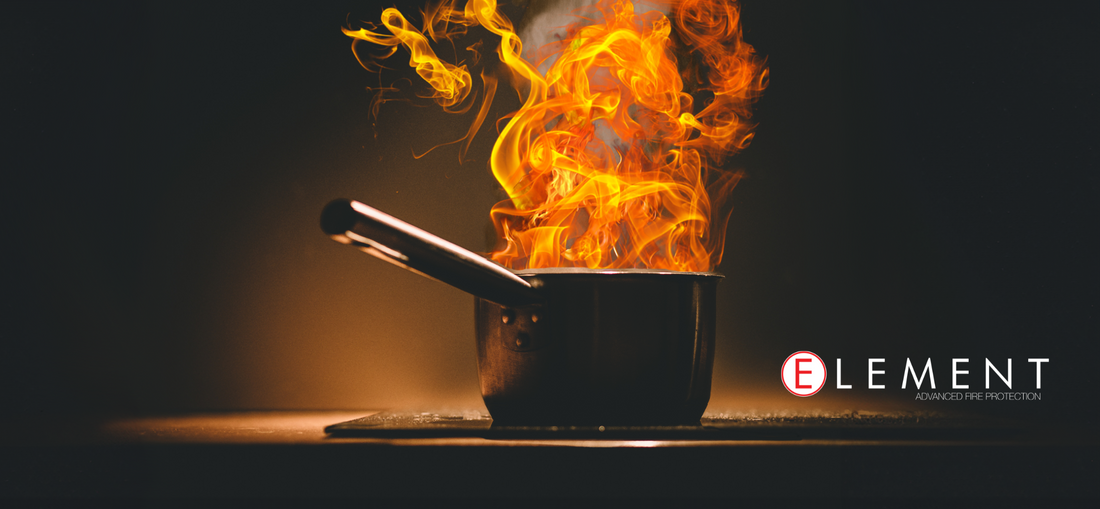Kitchen fires are a daunting occurrence that can happen to anyone. The risk of a fire starting on your stove, in your oven, or other cooking surfaces is always present regardless of whether you're a culinary expert or someone who occasionally dabbles. Grease fires are notorious for their ability to escalate rapidly among the various types of kitchen fires. These fires are made more dangerous when, in panic, someone uses water to fight it. Watch the video below that shows how a minor flare up can turn into an explosive emergency when water is added to the mix.
Grease Fires in the Kitchen
A grease fire begins when cooking oil becomes too hot. If the grease ignites, the flame can quickly catch on flammable materials, including wooden utensils you're cooking with, food packaging, and even the apron you're wearing. This can spread the fire in seconds and create a dangerous situation that's too big to get under control. The National Fire Protection Association (NFPA) cites unattended cooking as the leading cause of kitchen fires (source). The frequent occurrence of these fires is why it is so important to learn the basics of kitchen fire safety.
Why Water Makes Grease Fires Deadly

The fundamental mistake many make when confronted with a grease fire is attempting to douse the fire with water. It’s a natural first response but you must fight it! This approach is highly dangerous and makes the fire significantly worse. The water will instantly vaporize upon contact with the high temperatures of the fire and expand rapidly. This propels the burning grease into the air and will cause the fire to spread dramatically. The small kitchen fire is now an explosive inferno that can lead to more severe fire injuries or even a full-scale house fire that you can't control.
The Proper Way to Extinguish a Grease Fire
When a grease fire starts, the immediate steps you take can make a significant difference in the outcome. Here are critical actions to follow:
Stay Calm
This is probably the hardest thing to do when faced with a fire but panicking can impair judgment. Take a deep breath and assess the situation calmly to make informed decisions. How you react in the initial moments can significantly impact the outcome.
Turn Off Heat
If it’s safe to reach the controls without risking injury, cut off the fuel that feeds the fire by turning off the burner or heat source. Do not attempt to remove the pan! This could spread the fire.
Grab Your Element
Quickly grab your Element fire extinguisher to fight a grease fire and stop it from escalating. Element is rated to fight various types of fires, specifically class K fires. The compact design allows for easy and accessible storage anywhere around your home. Unlike traditional fire extinguishers, Element operates without producing any thrust. This is a significant benefit in situations involving liquid grease fires as it prevents the fire from spreading. Element's ease of use and efficiency makes it very capable fire safety equipment to fight kitchen fires.
Don’t Have Element Handy?
Smother the Fire
If you do not have an extinguisher on-hand, use a metal lid or baking sheet over the flame to deprive it of oxygen. Ensure the cover is large enough to cover the pan completely. Using a glass lid is risky as it can shatter from the heat so avoid those. Don't open the cover until it has cooled to prevent reigniting.
Use Baking Soda (as seen in the video)
Baking Soda can help smother small fires. It’s messy and abrasive, so not great for your appliances, but will do the job. It’s important to use a generous amount directly on the flames. Salt can also be effective in large quantities. Do NOT use flammable cooking materials like flour or sugar as they will fuel the fire.
Call 911
If you cannot control the fire quickly or it begins to spread, evacuate everyone from the premises immediately. Call 911 once safely outside. Do not attempt to re-enter the building until it is declared safe by fire officials.
A Safer Solution for Grease Fires
Having the right tools at your disposal is crucial when trying to get a kitchen fire under control. Element is your compact, always ready, kitchen fire extinguisher you can rely on. Traditional dry chemical fire extinguishers leave a messy and toxic residue that can potentially ruin your stovetop, cooking equipment and appliances. Baking soda is messy and you should never, ever, use water on a kitchen fire. Element is a no mess, non toxic clean agent extinguisher that interrupts the chemical chain reaction of fire to extinguish it without additional damage. It can safely fight a stove fire, oven fire, or even microwave fire.

Element is particularly suited for kitchen use because it is lightweight, easy to store in a cabinet or near cooking surfaces, and does not require any maintenance. Its effectiveness on grease and electrical fires makes it a versatile tool for cooking fire safety. Element ensures that even if a cooking accident occurs, you can quickly and confidently put out the fire without the risk of spreading it or causing further damage.
This is why understanding the basics of fire safety is crucial for saving your home against fire. Familiarizing yourself with proper fire safety and equipping your kitchen with the right fire fighting tools, like Element, significantly reduces the risk of a deadly fire. Be sure to avoid making the fire worse by throwing water on it, like in the video. When dealing with fire, safety awareness and preparedness saves lives.

